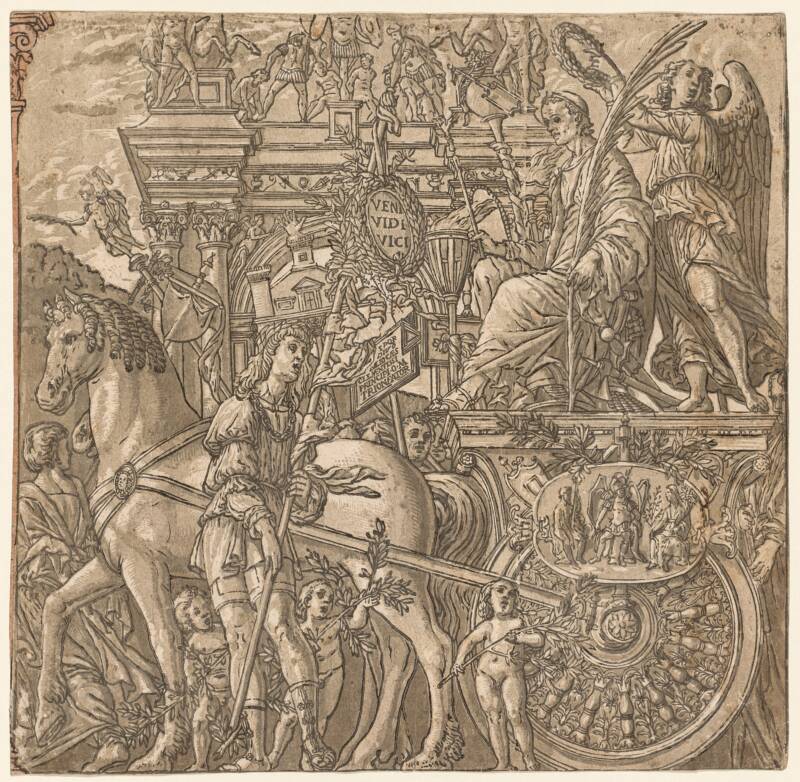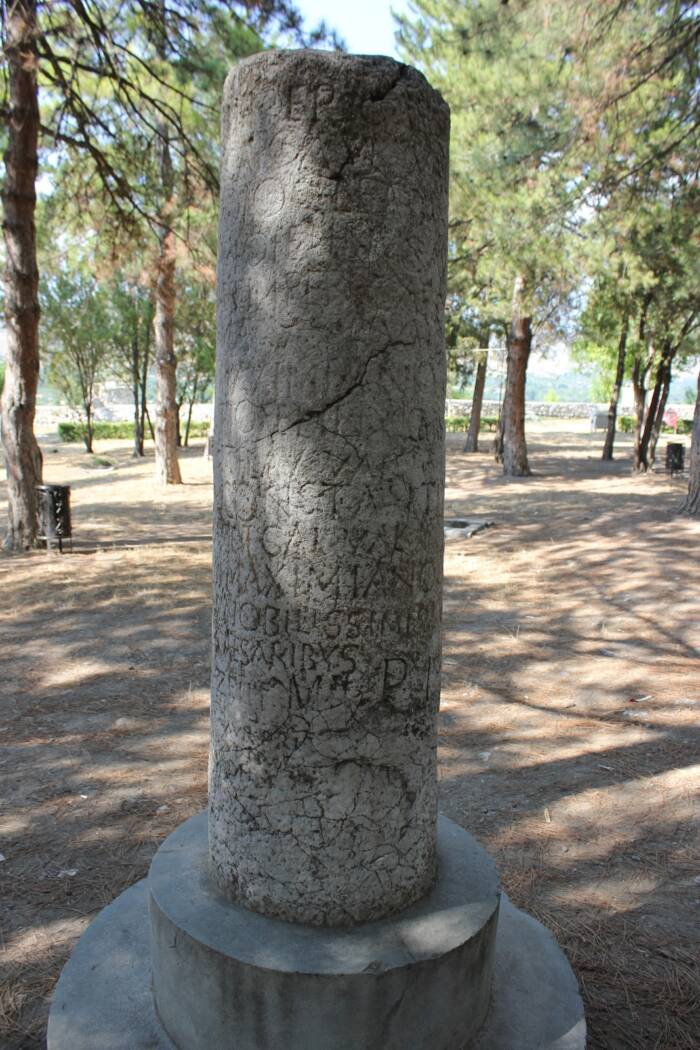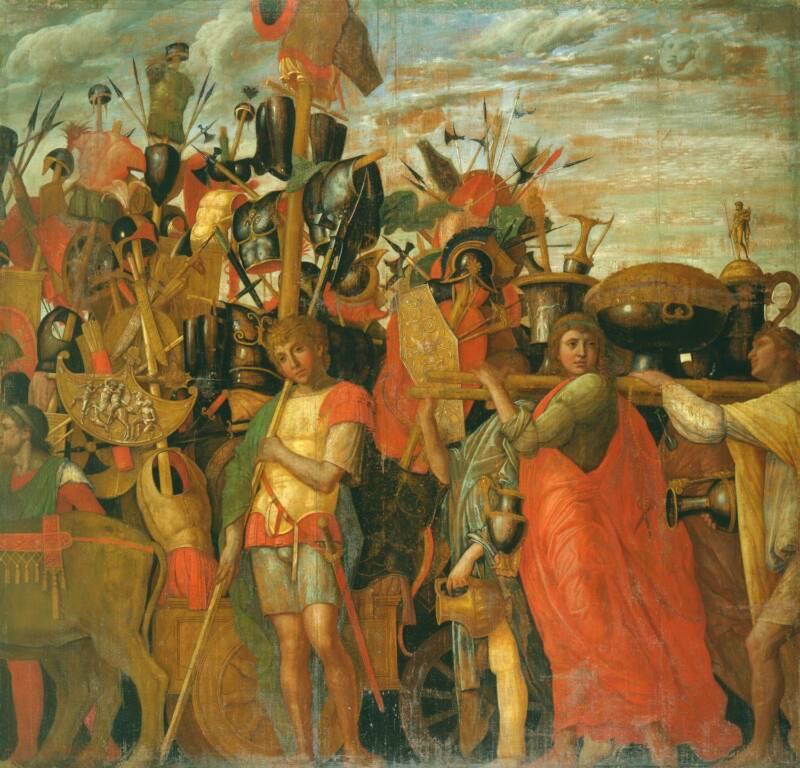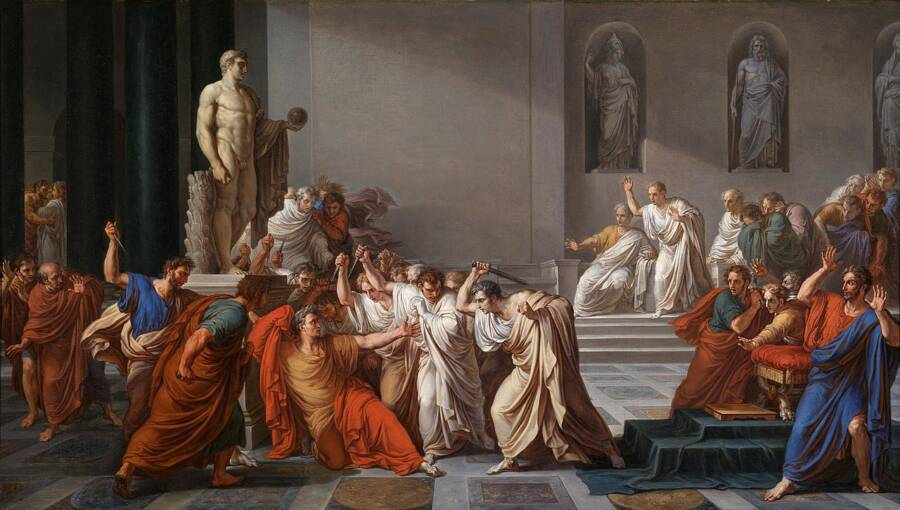According to ancient historians, Julius Caesar boasted, "Veni, vidi, vici," or, "I came, I saw, I conquered," after easily defeating the Pontic army at the Battle of Zela in 47 B.C.E.

Cleveland Museum of ArtOne Roman historian claims that Julius Caesar displayed the words “Veni, vidi, vici,” during a parade in Rome after the Battle of Zela.
Many of Julius Caesar’s words have endured through the millennia. But perhaps the most famous phrase attributed to the powerful Roman general was “Veni, vidi, vici,” meaning, “I came, I saw, I conquered.”
The simple phrase captured a huge event in ancient history: the moment that Julius Caesar cemented his power. In the aftermath, he took absolute control of Rome and named himself dictator for life.
This is the history of “Veni, vidi, vici,” from the circumstances that led Caesar to say it to how the famous words became a powerful political slogan.
The Decisive Battle That Led Julius Caesar To Declare, ‘Veni, Vidi, Vici’
By the time he uttered, “Veni, vidi, vici,” around 47 B.C.E., Julius Caesar had become one of the most famous men in the Roman Republic. After a swift rise as a soldier and a politician, he engaged in a civil war against the powerful Gnaeus Pompeius Magnus, a conflict that ended with Pompey’s assassination on the shores of Egypt in 48 B.C.E. Caesar secured the support of the Egyptians — and their queen, Cleopatra — and next turned to a conflict in present-day Turkey led by Pharnaces II, the King of Pontus.
Pharnaces was the son of Mithridates, a king who had fought — and lost — against the Romans several times during the Mithridatic Wars. With Pharnaces seemingly looking to continue in his father’s footsteps, Caesar moved quickly to defeat the king and quash the conflict.

Anassagora/Wikimedia CommonsA statue of Julius Caesar in Turin, Italy.
He and his forces moved so quickly, in fact, that Pharnaces panicked and tried to make peace. Instead, Caesar and his army secured a rapid and decisive victory at the Battle of Zela in 47 B.C.E.
It was after this battle that Caesar purportedly declared, “Veni, vidi, vici,” or, “I came, I saw, I conquered.” However, both ancient and modern-day historians have long debated about the circumstances surrounding the famous phrase.
The Debate Over ‘Veni, Vidi, Vici’
How and when did Julius Caesar declare, “Veni, vidi, vici?” Though historians agree that the phrase was uttered after the Battle of Zela, there’s an enduring debate over exactly where and how Caesar said it.

Lubunya/Wikimedia CommonsA column from Zile Castle, where some believe that Julius Caesar uttered, “Veni, vidi, vici,” after the Battle of Zela.
Plutarch, a Greek historian born roughly a century after the Battle of Zela, claimed in The Parallel Lives that Caesar wrote the words to a friend, Amantius.
“Caesar marched against [Pharnaces] with three legions, fought a great battle with him near the city of Zela… and annihilated his army,” Plutarch wrote. “In announcing the swiftness and fierceness of this battle to one of his friends at Rome, Amantius, Caesar wrote three words: ‘Came, saw, conquered.'”
Another Greek historian, Appian, told the story a little bit differently. Appian was born some 50 years after Plutarch, and he suggests in The Histories that Caesar wrote, “Veni, vidi, vici,” in a more formal letter to Rome.
“[Caesar] sprang upon his horse and at the first shout put Pharnaces to flight and killed a large number of the enemy, although he had with him only about 100 of his own cavalry,” Appian wrote. “Of this battle he wrote to Rome the words, ‘I came, I saw, I conquered.'”

Metropolitan Museum of ArtA bust of Julius Caesar.
However, the Roman historian Suetonius — born after Plutarch but before Appian — recorded the history of the “Veni, vidi, vici” phrase differently. In The Lives of the Twelve Caesars, he claimed that Caesar used the words to tweak a Roman military tradition that involved tituli (inscribed tablets).
Victorious Roman generals were traditionally welcomed home with military parades. Normally, they would display information on tituli about the number of enemies they had killed or the places they had destroyed. According to Suetonius, Caesar instead displayed just three words: “Veni, vidi, vici.”
“Having ended the wars, [Caesar] celebrated five triumphs,” Suetonius explained in the The Lives of the Twelve Caesars. “In his Pontic triumph he displayed among the show-pieces of the procession an inscription of but three words, ‘I came, I saw, I conquered,’ not indicating the events of the war, as the others did, but the speed with which it was finished.”

Public DomainA 15th-century depiction of one of Julius Caesar’s triumphs, military parades that celebrated victorious generals.
Modern-day historians have debated over which form of “Veni, vidi, vici” is most likely. Of the three, Suetonius’ seems like the most obvious grab for power. By displaying the words on tituli, Caesar expressed his political power, his military might, and his individuality from the Roman Republic.
And, of course, Julius Caesar famously declared himself “dictator for life” in Rome just a few years later.
The Legacy Of Julius Caesar’s Famous Boast
In 44 B.C.E., Julius Caesar seized absolute power in Rome and declared himself dictator for life, a move that seemed antithetical to the values of the Roman Republic. Just a few months later, Caesar was assassinated by dozens of Roman senators who feared his growing power, including his friend Marcus Junius Brutus. Caesar’s assassination led him to utter another of his famous phrases: “Et tu, Brute?”
Caesar was dead, but his assassination led to the rise of the Roman Empire. And the power of his simple phrase, “Veni, vidi, vici,” lasted throughout history.

Public DomainThe assassination of Julius Caesar in 44 B.C.E. led to the rise of the Roman Empire — and another of his famous phrases: “Et tu, Brute?”
After the Battle of Vienna in 1683, the King of Poland quipped: “We came, we saw, God conquered.” Upon the death of Muammar Gaddafi in 2011, U.S. Secretary of State Hillary Clinton remarked: “We came, we saw, he died.” And even the 1984 film Ghostbusters includes a nod to the phrase, with one character famously declaring: “We came. We saw. We kicked its ass!”
As such, the three simple words, “Veni, vidi, vici,” cast a long shadow across human history. Julius Caesar’s boast after the Battle of Zela was about more than winning one fight. Caesar had not only conquered Pharnaces but all of his enemies — including his most bitter rival, Pompey. By uttering, “I came, I saw, I conquered,” Caesar marked a new stage in his rise to power, one that would ultimately end with his dictatorship — and his assassination.
After reading about the origins of the phrase “Veni, vidi, vici,” discover the history of the term “Crossing the Rubicon,” which is also linked to Julius Caesar. Or, go inside the complicated question of why the Roman Empire fell.





